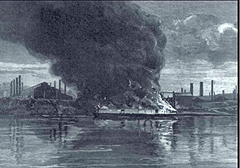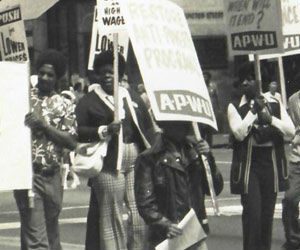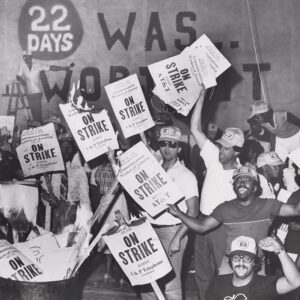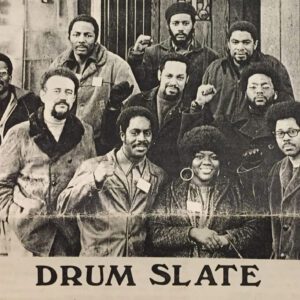October 31, 2006
A Checkered Past
(This article was first published in the November/December 2006 issue of The American Postal Worker magazine.)
Corporations desirous of ascertaining whether their employees are joining any secret labor organizations with a view of compelling terms from employers can [hire] a detective suitable to obtain this information. — Pinkerton advertisement, early 1890s
Offering a range of “private investigative” services, the Pinkerton Detective Agency was founded in 1850 and at first specialized in train robberies: the protection of railroad property. By the late 1860s, however, Pinkerton agents were protecting all manner of property — most notoriously when its ownership was at odds with organized labor.
“Pinkerton” survives to this day as part of an international security business, but is nothing more than a brand name, while the name itself maintains its strong historical associations with anti-worker movements that typically involved organized brutality.
A native of Glasgow, Scotland, Allan Pinkerton emigrated to the United States in 1842 at age 23. Trained as a cooper, or barrel-maker, the future detective had had to flee the United Kingdom because of his association with a radical group seeking to reform Parliament: Young Pinkerton was a well-known advocate of civil disobedience.
Settling near Chicago, Pinkerton started a cooperage. During a wood-gathering visit to a previously uninhabited island, he chanced upon a counterfeit-coin ring and alerted the authorities. This led to his appointment as a deputy sheriff and he soon had become Chicago’s first full-time detective. A few years later he left the city police force and started his own agency.
Working with the railroads was an ideal way to get one’s name before the public. In 1861, Pinkerton was given credit for uncovering an inauguration-train-stop plot against Abraham Lincoln. An impressed president hired the agency to spy on the Confederacy. Pinkerton operatives were known as a “secret service,” but were not the predecessors of the Treasury Department entity we know today, which did not begin to protect U.S. presidents until the 1890s.
The Agency’s Reputation

Pinkerton returned to Chicago after the Civil War and supervised the development of an impressive criminal database, including the world’s largest collection of mug shots. The agency’s logo, known as “The All-Seeing Eye,” is acknowledged as inspiring the term “private eye” to describe a private investigator or detective.
A lot of agency detective work, however, became “protective” work. With labor disputes often turning violent, several states had enacted laws to give businesses the authority to create or rent police forces.
The Pinkerton agency’s first foray into strikebreaking took place at an Illinois mine in 1866, during which it provided “guards” to “protect” replacement workers. An armed force would escort scabs into a factory, plant or mine, while armed watchmen in towers would intimidate strikers.
Hundreds of strike-breaking operations were created during the 1870s, with some, such as the Baldwin-Felts Agency, openly boasting about organizer harassment and other “labor discipline services.”
One infamous “Pink” was James McParlan, who infiltrated the Molly Maguires, a secret organization of coal miners. Beginning in 1872, he was part of the “Mollies” for perhaps four years, and allegedly witnessed several incidents of terrorism in the coal fields. He later offered sensational testimony during murder trials, which ultimately led to the hanging of 10 men. Historians are divided on whether the “Mollies” were truly guilty and, if so, whether these 10 in particular were set up, possibly by McParlan. Pinkerton, no stranger to self-promotion, gave his favorable version of events in a book published in 1877: The Molly Maguires and the Detectives.
A year later, he authored Strikers, Communists and Tramps. The title is quite telling, and in the pages of the book he defended the use of his agents as strikebreakers, arguing that it was an extension of his original property-safety business and that opposition to unionism was a good way to “protect”workers.
Homestead and Other Riots
In late June 1884, Allan Pinkerton stumbled during a stroll on a sidewalk. He bit his tongue, developed gangrene, and died quickly thereafter, at age 64. His sons, Robert and William, took over the agency, whose reputation as a force against labor continued to grow. Pinkertons were alleged to have ignited the bomb that sparked Chicago’s deadly Haymarket Riot of 1886. At the very least this incident supported the notion that trouble often came on the heels of the Pinkertons. It made sense: Day-laborer “detectives” could perpetuate their own employment by inciting riots.
In the early 1890s, the iron and steel workers’ union was a strong one, with numerous contracts, including a threeyear agreement in the western Pennsylvania steel-mill town of Homestead. But even though the industry was healthy, Andrew Carnegie sought a wage reduction there. On July 1, 1892, with only a few days left under the contract, the union rejected the offer; the workers were locked out.
The Pinkertons were on their way, and they would not be welcome. “Our people as a general thing think they are a horde of cut-throats, thieves, and murderers,” Homestead’s mayor told newspapers, “and are in the employ of unscrupulous capital for the oppression of honest labor.” It was recalled how the agency had been used in nearby coal fields, in 1884 to protect Hungarians and Slavs brought in as strikebreakers, and in 1891 to protect Italian replacement workers hired to fill in for the then-striking Hungarians and Slavs.
The locked-out Homestead workers prepared to meet the Pinkertons on their own terms. A few days after the lockout began, a boatload of agents landed near the mill. A battle followed during which 10 men — including three detectives — were killed and three dozen wounded. After a 14-hour fight, the workers captured 300 agents and held them captive. A day later, the disarmed and disgraced Pinkertons were run out of town.
An angry Henry C. Frick, hired by Carnegie to run the mill with replacements, sought help from Pennsylvania’s governor. In a few days, the mill town of 12,000 was an armed camp. It stayed that way until the soldiers departed in late November, when the lockout officially ended in utter defeat: The union treasury was empty, and workers’ families were facing winter. Desperate workers went back in the mill, without a union.
Bad Publicity
Newspaper editorial writers used Homestead as an illustration of the plight of the common man, and the Pinkertons were seen as a tool of the unscrupulous corporation. The agency’s reputation never fully recovered; largely forgotten was the company’s role in the pursuit of outlaws such as Frank and Jesse James, and Butch Cassidy and the Sundance Kid.
By the early 20th Century, workers had achieved some governmental protections against thuggish strikebreaking practices. Union-busting tactics evolved, with the more successful anti-labor operations preparing large forces of replacement workers, sometimes skilled, and ready to travel where needed.
The Pinkerton company became mainly a security guard operation, with few public encounters with labor. Robert died in 1907, and William in 1923. Robert’s son, Allan II, a World War I veteran, led the agency until his death in 1930. The last of the line to lead the Pinkertons was Robert II, great-grandson of the founder. When he died in 1967, the private agency became a public corporation.
During the 1980s, the American Brands conglomerate acquired Pinkerton. In 1999, a European company, Securitas Group, absorbed the “brand,” and it soon had scooped up other big-name security firms. In 2003, Pinkerton, Burns, Wells Fargo, American Protective Services, First Security and others became Securitas USA.
Pinkerton Government Services, as the branch of Securitas is now known, has two divisions: Governmental Security and Homeland Security. A visitor to the company’s Web site learns about the “Private Eye” and the agency’s early days, but virtually nothing about strikebreaking.



